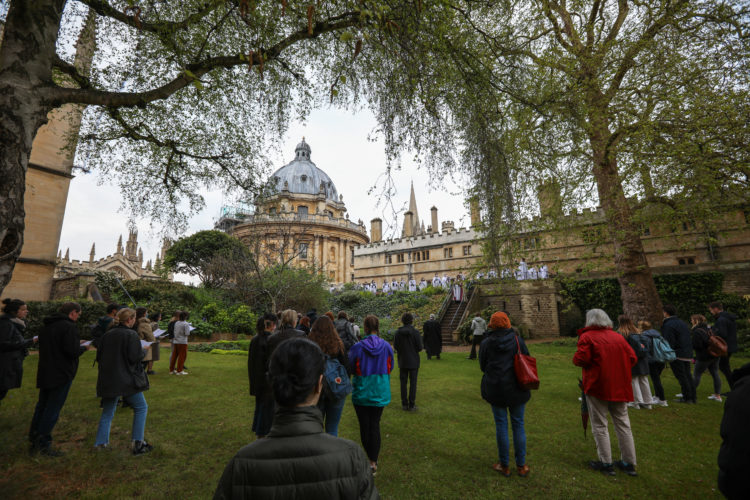Rector Trainor reflects on events of Trinity Term 2021
During Trinity Term, as Exeter began its 708th year, the College returned to a version, albeit highly modified, of normality.
Although some overseas students had to remain in their home countries, by mid-May, a series of relaxations of UK Government restrictions allowed the overwhelming majority of Exeter students to be present in Oxford. Admittedly restrictions remained on group gatherings both inside and outdoors, much teaching stayed online, and the vast majority of examinations were written on computers in student rooms. But carefully regulated student socialising resumed, with imaginative, socially distanced bar and musical events staged both by the MCR and the JCR. In-person chapel services returned: in particular, a spectacular Ascension Day Mattins in the Fellows’ Garden (with the Choir on the Mound), a Covid-safe alternative to the traditional event atop the Tower.

This year’s Ascension Day service took place in our Fellows’ Garden to allow for social distancing, followed by a takeaway breakfast
Meals in Hall re-started and were often consumed in the Marquee. ‘Schools dinners’ were held (unlike in 2020) for matriculated and Williams students alike, and the MCR staged an enchanting sit-down dinner (the first-ever?) in the Fellows’ Garden. The return of so many residents, and the resumption of catering, meant that staff members came back from furlough. Admittedly the nationwide rise in ‘variant D’ infections, although limited at Exeter, meant that a number of occasions had to be cancelled during 9th and 10th weeks when many students had remained in residence in the hope of enjoying Oxford. But there was widespread satisfaction – among students, Fellows and staff alike – that Exeter’s Trinity Term had been very largely ‘in person’.
Trinity Term’s most notable Exeter success was the OBE awarded in the Birthday Honours to Senior Research Fellow Professor Cath Green, a key member of the team which developed the Oxford Astra Zeneca vaccine. Also, during this first full week of July, Cath has published Vaxxers: The Inside Story of the Oxford AstraZeneca Vaccine and the Race Against the Virus (Hodder & Stoughton) jointly with Professor (now also Dame) Sarah Gilbert.
Senior Research Fellow Professor Cath Green has co-authored Vaxxers with Professor Sarah Gilbert about the Oxford Vaccine’s creation
Cath’s achievements set a very high standard, to be sure, but Exeter colleagues have had their own recent starring roles. For instance, Emeritus Professor Frank Close (Physics) secured election to the Royal Society, Professor Ervin Fodor (Virology) won membership of the prestigious European Molecular Biology Organisation (EMBO), and Professor Giuseppe Marcocci (History) won the biennial Chabod Prize for the best book by an Italian historian. Meanwhile, Sir Antonio Pappano (Honorary Fellow) was named the next Chief Conductor of the London Symphony Orchestra, and Professor Nandini Das (English) was appointed Vice President of the Hakluyt Society, becoming the first South Asian and the first person of colour to hold the position in the Society’s 175-year history.

L-R: Emeritus Professor Frank Close, Professor Ervin Fodor, Professor Giuseppe Marcocci and Professor Nandini Das
In Exeter’s webinar series, Professor Das also gave a talk on ‘The World in a Box: Cabinets of Curiosity’. Other Fellows in the series included Professor Andrew Steane (Physics) on ‘Science and Religion: a Humane Future’, General Sir Richard Shirreff (1974, Modern History, & Honorary Fellow), former deputy supreme commander of NATO, on ‘Battlefield to Boardroom: What might business learn from the military approach to managing risk?’, Professor Luciano Floridi (Ethics of Information) on ‘AI Developments and Ethical Challenges’; and Professor Mike Osborne (Engineering) on ‘Technology at Work: The Future of automation’.
Trinity Term featured many alumni accomplishments. Among them, Chris Pyrah (2011, Classical Archaeology & Ancient History) published his second novel, Heresy; David Goldbloom (1975, Physiological Sciences) published We Can Do Better: Urgent Innovations to Improve Mental Health Access and Care (Simon & Schuster); and Lord (Stephen) Green (1966, PPE, & Honorary Fellow) co-authored Unwritten Rule: How to Fix the British Constitution (Haus). On another front altogether, the fintech advisory firm Ammonite, co-founded by alumna Caroline Duff (2003, Physics & Philosophy), won selection for the Oxford Foundry accelerator programme. Another Exeter alumna scored a significant Oxford success when Reeta Chakrabarti (1984, English & French, & Honorary Fellow) skilfully chaired a panel session in the delayed celebrations of the very belated (though earlier than Cambridge!) formal entry of women to the University in 1920.
As a counterpoint to these achievements, there have been a number of recent deaths of former Fellows and alumni. The Fellows were Graham Shaw (Chaplain 1978-85), highly esteemed for his pastoral care, and Emeritus Fellow Dominic Donnelly (1958, Mathematics; Tutor in Maths 1970-2004), sometime Sub-Rector and longtime College resident. The alumni included: David Wright (1952, Music), a celebrated organist both at Exeter and for decades afterwards in England’s Boston; Robin Wallace (1955, Medicine), a paediatrician who distinguished himself by opening up sailing in previously nautically exclusive Newport, Rhode Island; and Roger Horrell (1955, Modern History), a diplomat who played a key role in the transition from Rhodesia to Zimbabwe and also served at MI6. There can be no doubt that Exeter’s alumni pursue highly varied careers!
Exeter’s students were the unsung heroes of the College’s Trinity Term as they endured a multitude of privations without complaint. There were significant notable student successes. For example, Tabitha Thornton-Swan (2018, Medical Sciences) won the national George Lewith Prize for General Practice for her Final Honours School Research Project on undiagnosed diabetes. Students participated vigorously in the College’s accelerating sustainability and environmental projects; the student role proved especially significant in Exeter’s carbon offsetting initiative and biodiversity audit. The College’s student charity ExVac met its goal of raising over £2,000 for children’s holidays by sponsoring over 50 Exeter staff and student participants in Oxford’s Town and Gown 10k race. On the river, Torpids rules prevailed in a necessarily subdued Covid-era week of competition; Exeter sported a women’s boat albeit not a men’s equivalent. Watch this space: the incoming Senior Member of the Boat Club, Finance & Estates Bursar Nick Badman, rowed for perennial power Oriel during his undergraduate days!

Over 50 of Exeter’s staff, students and SCR members joined forces to run the Oxford Town and Gown 10k event in aid of the College’s student-run charity, ExVac
During Trinity Term, much College attention, buttressed by alumni donations, was directed to improving student support and building on Exeter’s recent marked progress in diversifying its UK undergraduate student intake. But the physical spaces that students, staff and Fellows inhabit also loomed large. Governing Body approved a project to renovate the Lodge. Among the benefits will be wheelchair access and the opening, during daylight hours, of the outer wooden gate; no longer will the latter disguise from many passers-by that there is a college within!
Even more importantly, plans to renovate the historic College Library recently received approval both from the City of Oxford and from the Governing Body. This long-postponed makeover of this cherished and heavily used College building will provide extra reading spaces and up-to-date working environments. The project will also restore Gilbert Scott’s Victorian masterpiece to its former glory. Exeter alumni will shortly be receiving requests to support a special appeal designed to bridge the funding gap between what has already been raised and what is needed to complete this key endeavour.

The main entrance to the Library will be moved to the east, adjacent to the Bodleian, providing easy access to a new elevator and fully accessible WC. Computer-assisted designs courtesy of Nex Architects
Much was achieved, then, during Exeter’s semi-normal Trinity Term. A great deal of the credit for this progress can be traced to the way in which everyone associated with the College, very much including student leaders, steadily pursued the common interest, overcoming the many disruptions and problems posed by Covid-19. This unified approach, which has characterised Exeter throughout the current public health crisis, should be a great help as the College navigates the next few months of the pandemic.
Marguerite and I wish the whole Exeter community a restorative summer as we all look forward to what is envisaged as an almost normal academic year in 2021/22, complete with (Covid willing) graduations, gaudies, and a Ball.
Rick Trainor
Rector

